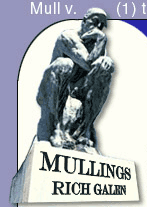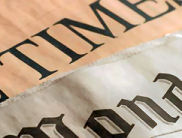

Subpoena Wars: Pelosi Can't Win
Friday March 23, 2007
Click here for an Easy Print Version
Don't forget to check out 
New Every Wednesday!
Got a question? Get an answer. Send an e-mail to
Dear Mr. Mullings
The current projectile-sweat-the-Republic-is-in-danger-of-collapse issue is whether the President will respond to subpoenas issued by the House and Senate Judiciary committees which would require (at a minimum) Karl Rove and former White House Counsel Harriet Miers to testify under oath about the firing of those eight previously unknown US Attorneys.
SIDEBAR
Let's be clear about this. The Democrats will spend some portion of their day, every day until 12:01 pm on January 20, 2009 trying to get Karl Rove to testify under oath about something so they can ask him about everything.
As far as the Democrats are concerned, Karl Rove is Darth Vader, Voldemort, and Professor Moriarty all rolled into one.
END SIDEBAR
This tug-of-war between the Executive and Legislative branches of government is not that new. In fact, according to an essay on the Findlaw.com website by Columbia University professor of law Michael Dorf:
In 1796, President Washington refused to comply with a request by the House of Representatives for documents relating to the negotiation of the then-recently adopted Jay Treaty with England. The Senate alone plays a role in the ratification of treaties, Washington reasoned, and therefore the House had no legitimate claim to the material.
Not long after, according to Professor Dorf, President Thomas Jefferson refused a demand by Chief Justice John Marshall that he produce a document demanded by the attorney for Aaron Burr (who was on trial for treason).
Jefferson refused to comply with the order of the Chief Justice, but decided provide the document "voluntarily" thus preserving the rights of the Presidency.
If you think these ancient and obscure examples are not relevant, think again. From Dorf's essay:
Thus, President Clinton negotiated the terms under which he appeared before Independent Counsel Kenneth Starr's grand jury, rather than simply answering a subpoena directing him to appear.
Cool, huh?
Usually, an accommodation is reached. According to an article by John Dean (yes, THAT John Dean):
During the Reagan Administration, Martin Anderson took charge of the Office of Policy Development and refused to testify. The House then refused to give him any money. Anderson met "informally" with the subcommittee, and his budget was restored.
But let's assume no accommodation is reached. What then? According to Washington attorney Alan Baron, if a subpoena is issued (which has not yet happened) and if the President decides to defy (or ignore) it; the next step is for the House and/or the Senate to declare, by majority vote, that the person who has been ordered to appear is in contempt of Congress.
Leaving aside the notion that the Congress - not matter which party is in control - is often eminently contemptible, the U.S. Attorney's office must bring the contempt case before a grand jury to decide whether the person who has ignored the subpoena should be charged with the crime of � ignoring the subpoena.
If the grand jury indicts, then the case goes to trial and the U.S. Attorney - acting on behalf of the Congress - must prove the case.
Are you still with me?
Because here's the really interesting part: Let's say Karl Rove is subpoenaed by the Dems and the President orders him not to comply. The House votes that he is in contempt and the case goes to the U.S. Attorney. The U.S. Attorney convenes a Grand Jury which indicts Rove.
To use the Scooter Libby case as a guide: The criminal investigation about the leak was opened in September, 2003. Mr. Libby was convicted in March 2007 - three and-a-half years later.
Even assuming things move along at an extraordinarily fast pace, a trial in the E. Barrett Prettyman Courthouse will be scheduled and, guess what? The President invokes his power of the pardon; pardons Rove and the bidding for the book deal begins.
That is the absolute outer edge of the end of the current subpoena battle but, in the end, Nancy Pelosi loses because neither Rove nor Miers ever testifies under oath.
On the Secret Decoder Ring page today: A link to the Dorf and to the John Dean essays; also a Mullfoto which will help you understand why I don't have many friends and a Catchy Caption of the Day.
ALL THAT PLUS - The latest edition of Dear Mr. Mullings. New Today!
--END --
Copyright © 2007 Barrington Worldwide, LLC
Become a
Paid Mullings Subscriber!
(To join the FREE mailing list or to unsubscribe Click Here)

Current Issue |
Secret Decoder
Ring | Past
Issues | Email
Rich | Rich
Who?
Copyright �2006 Richard
A. Galen | Site design by Campaign
Solutions. |





 US & Int'l Papers
US & Int'l Papers
